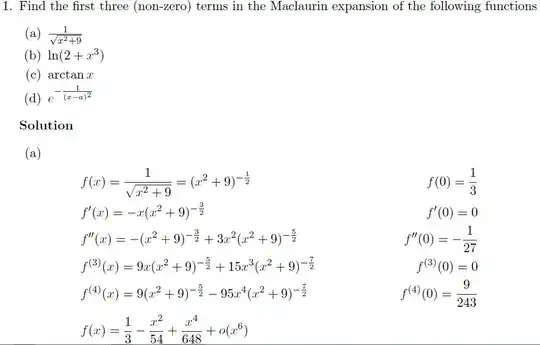The coefficients you have found are correct. The problem is that the second approach is very complicated in the sense that it will give a series with each term containing a binomial series, so you would be handling a very complicated expression.
You could consider the general solution via the binomial theorem:
$${\left( {{x^2} + 9} \right)^{ - 1/2}} = \frac{1}{3}{\left( {1 + {{\left( {\frac{x}{3}} \right)}^2}} \right)^{ - 1/2}}$$
$${\left( {1 + {{\left( {\frac{x}{3}} \right)}^2}} \right)^{ - 1/2}} = \sum\limits_{k = 0}^\infty {-1/2 \choose k} {\frac{{{x^{2k}}}}{{{9^k}}}} $$
You can find many places where you'll get the closed for of that binomial coefficient:
$${-1/2 \choose k} = (-1)^k \frac{(2k-1)!!}{(2k)!!}= \frac{1}{(-4)^k}{2k \choose k}$$
so you finally have
$$\frac{1}{3}{\left( {1 + {{\left( {\frac{x}{3}} \right)}^2}} \right)^{ - 1/2}} = \sum\limits_{k = 0}^\infty {{{\left( { - 1} \right)}^k}\frac{{\left( {2k - 1} \right)!!}}{{\left( {2k} \right)!!}}} \frac{{{x^{2k}}}}{{{3^{2k + 1}}}}$$
$$\frac{1}{{\sqrt {{x^2} + 9} }} = \sum\limits_{k = 0}^\infty {{{\left( { - 1} \right)}^k}\frac{{\left( {2k - 1} \right)!!}}{{\left( {2k} \right)!!}}} \frac{{{x^{2k}}}}{{{3^{2k + 1}}}}$$
Note that all terms are of even powers, so that as you showed all odd terms are $0$.
